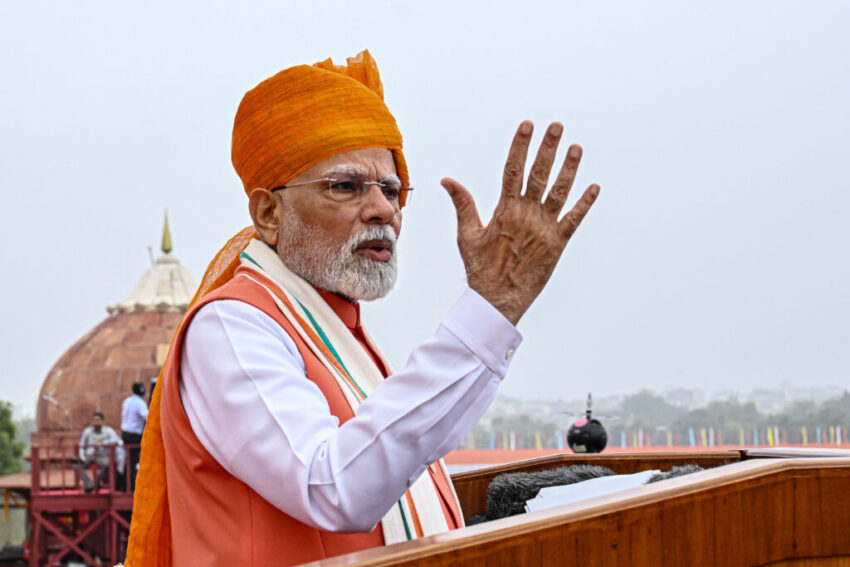
India’s Prime Minister Narendra Modi announced tax cuts, pledged policy reform and urged the citizens to design and produce high quality goods at home, in a sweeping Independence Day speech that advocated for self reliance in a protectionist global economy.
“In the global situation, economic selfishness is increasing day by day,” Modi said in his address to the nation from the historic Red Fort in New Delhi on Friday. “The demand of the time is to move ahead with courage and meet our own goals.”
The remarks come against the backdrop of US President Donald Trump’s global trade war. In the last few weeks, Trump hit India with a 50% tariff rate – much higher than the regional peers. The levies could hurt exports and put nearly 1% of the nation’s gross domestic product at risk, analysts said.

In the 103-minute speech, Modi batted for self sufficiency in critical sectors, including energy, minerals and defense. Labeling India’s dependence on imports as “unfortunate”, Modi asked industrialists and the private sector to build quality goods and look at ways to lower production costs.
“We should not waste our energy in belittling others, our focus should be on strengthening ourselves,” he said. “For a nation, the greatest criteria for self-dignity is its self-reliance,” Modi added, while addressing a crowd wearing white hats printed with the slogan “New India”.
For years, Modi has promoted ‘Make in India’ policy, with his government spending billions of dollars in incentives for companies to manufacture locally. However, the push for homegrown goods and technology have taken on new urgency amid the rising global uncertainty.
The Indian leader said the government is taking steps to make the nation self-reliant in energy, with initiatives in the solar, hydrogen and nuclear sectors. He also added that the country is now working in “mission mode” in the semiconductor sector, with first locally-made chips expected in the market by the end of this year.
“The speech suggests that there is greater focus on self sufficiency across various sectors amid growing geo-economic fragmentation and weaponization of global supply chains,” said Sonal Varma, an economist with Nomura Holdings Inc.
– – –
New Normal
Hitting a nationalistic note, Modi said that India’s security policy had entered a “new normal” where nuclear blackmail would not be tolerated.
“We will no longer differentiate between terrorists, those giving support and strength to them,” said Modi, with the name of the military mission undertaken against Pakistan, “Operation Sindoor” spelled out with flower petals on a massive hoarding in the backdrop. He also said India and its farmers have sole right over its share of water from the Indus river.

Declaring that the ways of war have changed, Modi said that India was adapting to the evolving warfare and will develop a “precise” and “targeted” indigenous weapon system in the coming decade, to protect strategic installations, cities, and sacred places from missile and drone attacks. “This will be a formidable deterrent to any hostile attempt to harm us,” he added.
Turning to domestic security, Modi announced the government will be setting up a “demography mission” to address the imbalance caused by infiltration and illegal migration into India. The government has been aggressively pursuing the issue of immigration, from its Muslim-majority neighbor Bangladesh and has instituted policies in the past to counter it.
– – –
Protecting Farmers
Modi reiterated his commitment to protect its agriculture, dairy and marine sectors from global headwinds. “I will stand like a wall against any harmful policies impacting them,” the prime minister asserted. “India will never accept a compromise on anything related to its farmers, cattle herders and fishermen.”
Modi and his ruling party have seized on growing friction with the US to bolster support from farmers ahead of a crucial state election. Farmers are one of the most influential voting blocs in the world’s most populous nation. India’s trade agreement with the US has been stuck due to its reluctance to open up its domestic market to US agriculture and dairy products.
– – –
More Reforms
Hailing India’s might, the prime minister said the nation’s macro-economic fundamentals remain strong, with inflation in control and a foreign reserve war chest adequate. That means India “must focus on even greater goals now,” he said.
The government will cut consumption tax for the first time since it was introduced nearly a decade ago, to spur economic demand and boost consumption. “We are bringing next-generation Goods and Services Tax reforms that will reduce the tax burden drastically across the country,” Modi said.
Since its introduction in 2017, businesses had been calling for simplification of the complex tax structure. The changes will be unveiled around the Hindu-festival of Diwali, scheduled for October this year, the Indian leader said, though he did not give details of the proposed changes.
The tax tweaks could boost a slowing economy and lift disposable incomes for the middle class. India’s central bank sees the economy expanding 6.5% in the fiscal year that started in April – same as last year and way below the average 8% growth seen before that.
“The India GST reform could be a trigger to shake Indian markets out of their slumber,” said Rajeev De Mello, a portfolio manager at Gama Asset Management SA.
The nation’s equity benchmark NSE Nifty 50 Index is up 4% in 2025, underperforming S&P 500 Index’s 10% gains and the MSCI China Index’s 27% advance.
The nation will also set up a task-force that will suggest next-generation reforms in a time-bound manner, Modi added. Its mandate will be to accelerate economic growth, cut red tape, modernize governance, and prepare the country for the demands of a $10 trillion economy by 2047, he said.
–With assistance from Winnie Hsu.



